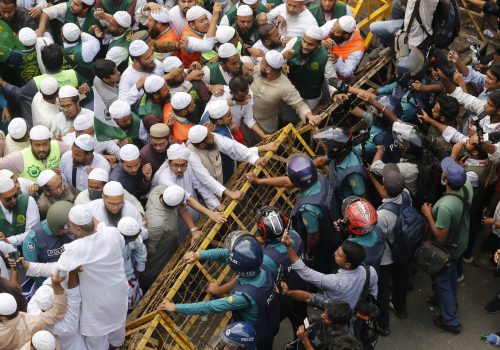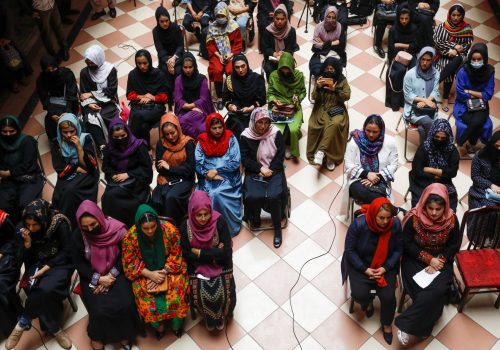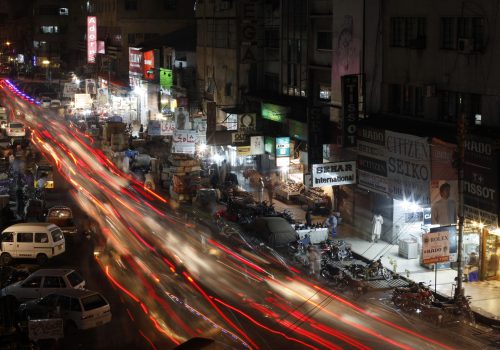What Bangladesh’s widely boycotted election reveals about its future
In an essentially uncontested election on January 7, the incumbent prime minister of Bangladesh, Sheikh Hasina, and her party, the Bangladesh Awami League (BAL), returned to power for a fourth consecutive term. The result was not a surprise, but events around the election and the fault lines that were revealed could have ramifications for Bangladesh in the weeks and months ahead.
The election drew international attention for several reasons, including as a case of geopolitical tug-of-war between Western nations on one hand (especially the United States) and India, China, and Russia on the other. The election was boycotted by Bangladesh’s opposition parties, including the main opposition Bangladesh Nationalist Party (BNP), while the BAL and its allies participated. The record of democratic backsliding under Hasina, described as “Asia’s iron lady,” and the country’s ongoing economic crisis, which forced it to seek loans from the International Monetary Fund, were the central issues of discussion in the international media in the run-up to the election and immediately after. Hasina’s election victories in 2014 and 2018 were similarly one-sided, as the ruling party, civil administration, and law enforcement agencies acted in unison to deliver a victory for her and the BAL. In the lead-up to this year’s election, the opposition demanded that Hasina resign, and a neutral administration oversee the election, like with the elections held between 1991 and 2008. The incumbent rejected the demand and forged ahead with the election.
The peaceful opposition movement started in the summer of 2022 and faced a violent crackdown beginning on October 28, 2023. Since then, thousands of opposition leaders and activists have been arrested, more than 1,500 have been convicted, and the party offices of the BNP throughout the country have been put under lock and key by law enforcement agencies. The ruling party adopted various tactics to make the elections appear competitive, such as trying to split the BNP, founding new political parties to entice BNP leaders, coercing and cajoling individuals and parties to join the election, and fielding its leaders as “independent” candidates to provide the veneer of a participatory election. Violence between the supporters official BAL candidates and the independent candidates cost almost a dozen lives, and incidents of arson in public transport were reported, despite heightened security measures.
Here are five takeaways from the election.
1. The election transformed Bangladesh into a one-party state
The election results were a foregone conclusion, as there were no opposition parties contesting. But the results revealed a deeper entrenchment of the BAL. Of the three hundred directly elected seats in parliament, the BAL alone secured 223, while “independents,” all of whom belong to the BAL, won sixty-two. This brings the total directly elected members of parliament loyal to the ruling party to 285—95 percent of the elected parliamentary seats. The BAL-aligned Jatiya Party (JP) won eleven seats, and Jatiya Samajtantrik Dal and Bangladesh Workers Party one seat each. Kalyan Party, which left the opposition movement immediately ahead of the election and was supported by the BAL and state apparatuses, has one seat. Only four candidates have been elected as independents who have no affiliation with any political parties. As such, nothing that could be described as an opposition exists in the parliament.
These facts alone point to one-party control over the state; however, the defining characteristic of the composition is that this provides all power to Sheikh Hasina. The party’s general secretary has even said that she will decide who will act as the opposition party in the parliament. In the previous two parliaments, JP was designated as the official parliamentary opposition. Now that the JP has fallen from the grace of the prime minister, it is still being speculated who Hasina will favor. This is a marker of a personalistic autocratic system.
2. Even the turnout figures can no longer be trusted
Ahead of the election, the only uncertainty was voter turnout. With no formidable opposition in the race and calls from the opposition to boycott the election, it appeared that the most daunting challenge to the ruling party was to attract voters to the polling booths. As the voting began, it became apparent that turnout would be low. Yet, at the end of the day, the Chief Election Commissioner Kazi Habibul Awal claimed that turnout was 40 percent. The announcement was made in a bizarre manner. Awal, in a press briefing after the polling was closed, initially said that the turnout was 28 percent, but changed immediately to the higher figure at the prodding of his colleague.
The 40 percent figure, described as “ridiculous” by experts, not only belied the facts as reported in the media throughout the day but also contradicted the Election Commission’s earlier accounts. Four hours after the polls opened, the Election Commission reported 18.50 percent turnout, and an hour before the polls were to close it was reported at 26.37 percent. Thus, according to this statement, almost 14 percent of votes were cast in the last hour. Interestingly, the Election Commission dashboard continued to have data that showed the turnout close to 28 percent. The earlier reported numbers as well as 28 percent were also seen as inflated.
3. People resoundingly rejected the exercise
The electorate voted with their feet: By and large, they decided not to show up at the polling booth risking future persecution. Even if the official turnout statistic is taken at face value, 72 percent of voters stayed home. Three factors have made Bangladeshis shun the stage-managed show. First, the government’s efforts to make the race appear competitive by propping up dummy candidates exposed the farcical nature of the election. Second, the ongoing economic crisis has made them less interested in voting, which will have no bearing on the future course of the ruling party’s economic policies. Between 1991 and 2008, when Bangladesh held freely contested elections, voters were eager to oust incumbents and elevate the opposition to power. Third, the electorate seemed to heed the oppositions’ call to boycott the elections, an indication of high anti-incumbency sentiment and the popularity of the opposition parties.
4. The United States’ half-hearted actions fell short
Since the beginning of 2022, the United States insisted that Bangladesh hold a free, fair, and inclusive election, and it repeatedly warned that an election which does not meet these criteria won’t be acceptable. High-ranking US officials made several visits to Dhaka, and they met with Bangladeshi officials, including Hasina, in Washington and New York to try to sway her. Hasina portrayed this pressure as an attempt to depose her from power.
In addition, the United States adopted a policy of allowing it to withhold visas from Bangladeshi officials who undermine democracy and called for a dialogue between two major parties to reach a solution. This promotion of democracy abroad was viewed as an integral part of the Biden administration’s foreign policy, with democracy and human rights as its cornerstones. There was widespread speculation that the United States would take punitive measures, including targeted sanctions, to push the Bangladeshi government toward a compromise. But these talks and postures were not backed with any concrete actions.
As well, the United States’ close relationship with India seems to have made Washington’s options limited, and India’s unqualified support for the Hasina government prevailed. After the election, the US State Department and the British Foreign Office described the poll as “not free and fair,” but this pronouncement fell far short of the actions that prior US statements seemed to indicate it would take.
5. The opposition is vindicated—but faces a tough road ahead
The opposition’s decision not to join the election, insisting that a fair election under the incumbent is not possible, has been vindicated, once again. The low turnout is one indication that the opposition’s boycott reflects popular sentiment. The opposition, especially the BNP, demonstrated that despite persecution and threats, it has remained intact. Its absence in the electoral process has exposed the government’s machinations. The BNP also showed that it can remain nonviolent despite provocations. But the movement also displayed the failure of the opposition to create a common platform to press for its demands and mobilize the people on the streets. Hasina’s characterization of the BNP during her election campaign as a “terrorist organization” does not bode well for its future. This is a message not only for the BNP, but to all the opposition parties and the critics of the ruling party.
Ali Riaz is a nonresident senior fellow at the Atlantic Council South Asia Center and a distinguished professor at Illinois State University.
Further reading
Fri, Nov 17, 2023
Bangladesh is at a tipping point. Here are the scenarios for a contentious election season.
New Atlanticist By Ali Riaz
Violence and street agitations are back in full swing in Bangladesh ahead of the scheduled general elections in January 2024.
Thu, Jun 29, 2023
How to advance women’s rights in Afghanistan
Issue Brief By Roya Rahmani
Providing Afghan women with rights and opportunities must be at the top of the regional and global security agenda.
Fri, Nov 3, 2023
Pakistan’s long journey toward sustainable growth requires timely, free, and fair elections
New Atlanticist By Uzair Younus
Elections should be followed by a transparent, consensus-driven process that devolves power to the grassroots level through functional local governments.
Image: Supporters of a candidate are gathering outside a polling station during the general election in Dhaka, Bangladesh, on January 7, 2024. (Photo by Rehman Asad/NurPhoto)


